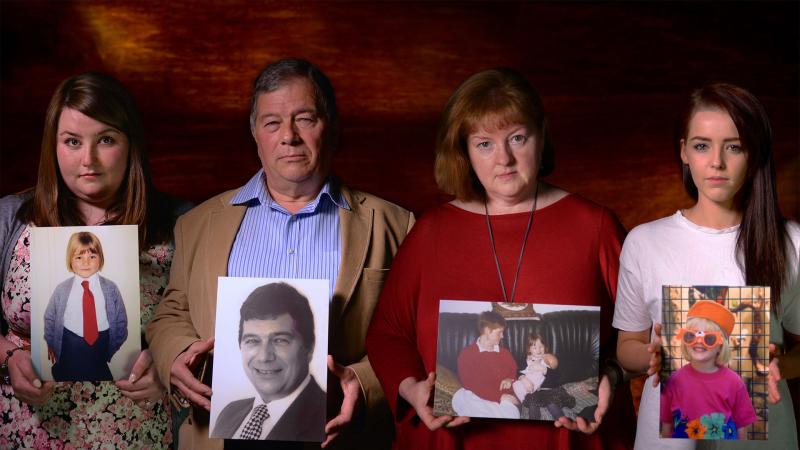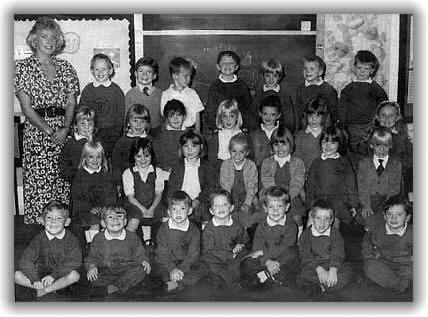Dunblane: Our Story, BBC Two | reviews, news & interviews
Dunblane: Our Story, BBC Two
Dunblane: Our Story, BBC Two
Compelling documentary marks 20th anniversary of murders

For anyone living in the UK at the time, the Dunblane massacre on 13 March 1996 was an event so seared into their minds that they can remember exactly where they were when the shocking news came through.
I was working on The Daily Telegraph's arts pages when, by a horrible coincidence, a film review was accompanied by a picture with a handgun in it; the page was quickly redesigned – as indeed was most of the paper as the awful story unfolded and the enormity of it became clear. In the small town of Dunblane, near Stirling, Thomas Hamilton had walked into Dunblane Primary School, and shot dead 16 pupils of Primary Year 1 and their teacher as they took a gym class. It remains the deadliest firearms atrocity in this country, and led to further restrictions on what were already strict gun laws in the UK.
To mark the 20th anniversary, Stephen Bennett produced this utterly gripping documentary, in which parents, siblings, survivors, the headmaster and police liaison officer spoke – almost all for the first time publicly – about that awful day. He used a simple but effective format – a fixed camera focused on the individuals as they talked – interspersed with background notes flashed on the screen and news footage from 1996, and only minimal reconstruction, which provided the only mildly discordant note in the film. Correctly, Hamilton hardly figured.
 In an hour filled with quiet but choking emotion, it was one of those bits of footage from the day after the shootings that hit me most, in which Superintendent Louis Munn read out a list of the dead children: after each of the 16 pupils' names he repeated the words “aged five” and ended the list with “Gwen Mayor, aged 45”. The last named was the teacher (pictured above with Primary Year 1) who tried to save her charges, a fact that her daughter, Debbie, says makes her very proud. Not for the first or last time in this hour, I was struck by the astonishing lack of bitterness as she spoke about her loss.
In an hour filled with quiet but choking emotion, it was one of those bits of footage from the day after the shootings that hit me most, in which Superintendent Louis Munn read out a list of the dead children: after each of the 16 pupils' names he repeated the words “aged five” and ended the list with “Gwen Mayor, aged 45”. The last named was the teacher (pictured above with Primary Year 1) who tried to save her charges, a fact that her daughter, Debbie, says makes her very proud. Not for the first or last time in this hour, I was struck by the astonishing lack of bitterness as she spoke about her loss.
Their testimonies were riven with what is clearly still raw emotion, with sentences that often trailed off. Alison and Catherine, from separate families, spoke about growing up without their elders sisters; Steve and Beverley about their guilt because their son, Matthew, survived; Isabel and Mick were, separately, two single parents who lost a daughter after having already recently lost their spouses; Ron Taylor, the headteacher, described the “unimaginably horrible” scene as he ran into the gym that morning.
Isabel, who lost her daughter Mhairi, was particularly eloquent about her loss. Mhairi was the only child of the 16 not to die at the scene; in the confusion and lack of organisation (the media had been informed about the number of deaths before the parents were finally told several hours after the shootings occurred), Isabel was not in the ambulance with her daughter when she died, and she understandably feels betrayed and angry.
It was also striking how important the language used to describe events is to the people of Dunblane. Mhairi didn't die, Isabel said – "Thomas Hamilton murdered her" – while Mr Taylor added: “Some people called it an incident, which was hardly appropriate.” His famous words, “Evil visited us yesterday", spoken when he was still in shock the day after, still ring down the years.
Amy, who survived her gunshot wounds, provided the programme's few lighthearted moments as she described being less than enthralled as a five-year-old by the Queen's visit to the hospital where she spent six weeks recovering, and the rank smell emanating from the school bag that was returned to her by police when their investigation had finished. “It was a banana.”
The film also ended on a positive note, as Alison spoke about the need for people to honour the dead, but how important it was for Dunblane to show that it can “power on”. A remarkable statement from a remarkable town in a remarkable film.
rating
Explore topics
Share this article
The future of Arts Journalism
You can stop theartsdesk.com closing!
We urgently need financing to survive. Our fundraising drive has thus far raised £49,000 but we need to reach £100,000 or we will be forced to close. Please contribute here: https://gofund.me/c3f6033d
And if you can forward this information to anyone who might assist, we’d be grateful.

Subscribe to theartsdesk.com
Thank you for continuing to read our work on theartsdesk.com. For unlimited access to every article in its entirety, including our archive of more than 15,000 pieces, we're asking for £5 per month or £40 per year. We feel it's a very good deal, and hope you do too.
To take a subscription now simply click here.
And if you're looking for that extra gift for a friend or family member, why not treat them to a theartsdesk.com gift subscription?
more TV
 theartsdesk Q&A: director Stefano Sollima on the relevance of true crime story 'The Monster of Florence'
The director of hit TV series 'Gomorrah' examines another dark dimension of Italian culture
theartsdesk Q&A: director Stefano Sollima on the relevance of true crime story 'The Monster of Florence'
The director of hit TV series 'Gomorrah' examines another dark dimension of Italian culture
 The Monster of Florence, Netflix review - dramatisation of notorious Italian serial killer mystery
Director Stefano Sollima's four-parter makes gruelling viewing
The Monster of Florence, Netflix review - dramatisation of notorious Italian serial killer mystery
Director Stefano Sollima's four-parter makes gruelling viewing
 The Diplomat, Season 3, Netflix review - Ambassador Kate Wyler becomes America's Second Lady
Soapy transatlantic political drama keeps the Special Relationship alive
The Diplomat, Season 3, Netflix review - Ambassador Kate Wyler becomes America's Second Lady
Soapy transatlantic political drama keeps the Special Relationship alive
 The Perfect Neighbor, Netflix review - Florida found-footage documentary is a harrowing watch
Sundance winner chronicles a death that should have been prevented
The Perfect Neighbor, Netflix review - Florida found-footage documentary is a harrowing watch
Sundance winner chronicles a death that should have been prevented
 Murder Before Evensong, Acorn TV review - death comes to the picturesque village of Champton
The Rev Richard Coles's sleuthing cleric hits the screen
Murder Before Evensong, Acorn TV review - death comes to the picturesque village of Champton
The Rev Richard Coles's sleuthing cleric hits the screen
 Black Rabbit, Netflix review - grime and punishment in New York City
Jude Law and Jason Bateman tread the thin line between love and hate
Black Rabbit, Netflix review - grime and punishment in New York City
Jude Law and Jason Bateman tread the thin line between love and hate
 The Hack, ITV review - plodding anatomy of twin UK scandals
Jack Thorne's skill can't disguise the bagginess of his double-headed material
The Hack, ITV review - plodding anatomy of twin UK scandals
Jack Thorne's skill can't disguise the bagginess of his double-headed material
 Slow Horses, Series 5, Apple TV+ review - terror, trauma and impeccable comic timing
Jackson Lamb's band of MI5 misfits continues to fascinate and amuse
Slow Horses, Series 5, Apple TV+ review - terror, trauma and impeccable comic timing
Jackson Lamb's band of MI5 misfits continues to fascinate and amuse
 Coldwater, ITV1 review - horror and black comedy in the Highlands
Superb cast lights up David Ireland's cunning thriller
Coldwater, ITV1 review - horror and black comedy in the Highlands
Superb cast lights up David Ireland's cunning thriller
 Blu-ray: The Sweeney - Series One
Influential and entertaining 1970s police drama, handsomely restored
Blu-ray: The Sweeney - Series One
Influential and entertaining 1970s police drama, handsomely restored
 I Fought the Law, ITVX review - how an 800-year-old law was challenged and changed
Sheridan Smith's raw performance dominates ITV's new docudrama about injustice
I Fought the Law, ITVX review - how an 800-year-old law was challenged and changed
Sheridan Smith's raw performance dominates ITV's new docudrama about injustice
 The Paper, Sky Max review - a spinoff of the US Office worth waiting 20 years for
Perfectly judged recycling of the original's key elements, with a star turn at its heart
The Paper, Sky Max review - a spinoff of the US Office worth waiting 20 years for
Perfectly judged recycling of the original's key elements, with a star turn at its heart

Add comment